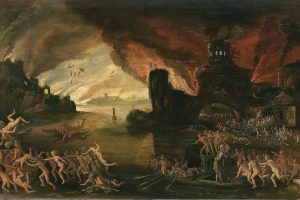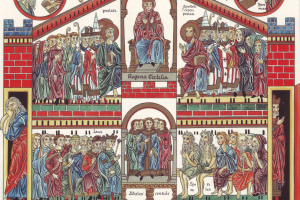 Catholics are valued voters for the candidates because they take their faith and their role in democracy seriously. In a 2008 U.S. Catholic survey, though, readers reveal that faith can lead voters in very different directions.
Catholics are valued voters for the candidates because they take their faith and their role in democracy seriously. In a 2008 U.S. Catholic survey, though, readers reveal that faith can lead voters in very different directions.
With approximately 38 million Catholic voters in the United States, presidential hopefuls John McCain and Barack Obama know they need to respond to the values and expectations of this group. And the group needs to be taken seriously not just for its size, but for its commitment: According to a U.S. Catholic Reader Survey, 84 percent say their faith greatly influences their voting decisions, and 87 percent say they always vote in elections.
The challenge for the candidates is that Catholic voters don’t all think the same, vote the same, or align with the same party. Faith and values may be a starting place, but depending on what issues and positions matter most to them, Catholics cast their ballots very differently.
“I could never vote for a president, congressman, or governor who supports abortion,” says a reader from Point Pleasant Beach, New Jersey.
Another reader from Lanham, Maryland says, “I consider how the candidate or issue impacts the poor and marginalized.” Still another, Edward Giblin of Rochester, New York says, “I look for candidates who seem to sincerely care about justice, human dignity, and sound moral values.”
And Ed McCarthy from Yorktown Heights, New York writes, “I’m voting for the candidate who will end the war.”
While these four respondents base their votes on church teaching, it’s unlikely they’ll be voting for the same candidate. And that’s to be expected, as Kathleen McCormack Lorenc from Endwell, New York points out: “There is no ‘Catholic’ candidate, just humans who come down on different issues differently. It is hard to pick the ‘perfect’ person—Jesus is unavailable for public office!”
Still, Catholic voters say that their faith formation is what helps them sort out right from wrong and determine which issues are priorities and which positions are most just, even when situations are complicated or controversial. “My faith offers a lens through which I can view political issues,” says James C. Gorman of Boston. “It is the grounding of the values I wish to incarnate.”
The three most popular issues that respondents say they consider when casting their ballots are war and peace (85 percent), health care (76 percent), and the economy (70 percent). It’s likely that the country’s current state of affairs influenced those results, but some readers try to use the same criteria in all elections.
“I look for a person who cares what happens to all Americans, providing availability of health care and respect for human life,” says a reader from Central Islip, New York. And Siobhan McLaughlin of Hollywood, Florida says, “Peace and justice undergird my faith and activism, hence my vote.”
Because Catholic values and teaching don’t fit neatly into one political party, most voters end up picking the party that most closely matches the priorities they want to see addressed. Among the Reader Survey respondents, 50 percent said they most identified with the Democratic Party, 37 percent said Republican, and 9 percent said independent. (U.S. Catholic readers are not representative of Catholic voters in general. According to the Pew Research Center, 37 percent of all Catholic voters are Democrats, 27 percent are Republicans, and 31 percent are independents.)
Having to choose a party isn’t easy for some, though, and a few readers strongly expressed their exasperation. “I am a pro-life Democrat,” says a reader from McLean, Virginia. “The Republicans are anti-abortion, which is good, but they are not pro-life. The Democrats are pro-choice, which is wrong, but they are pro-life otherwise.”
A reader in New York explained: “I am a registered nonpartisan. I dropped out of the Democratic Party because of its pro-choice platform.” But she also isn’t pleased with the Republican Party’s anti-abortion focus. “I believe that the Catholic Church’s [anti-abortion] pro-life emphasis to the exclusion of other life-and-death issues is partially responsible for the election of ‘W,’ who claims to be pro-life but has no regard for the already born.” She sees McCain as offering “more of the same.”
When it comes to this election’s candidates, most respondents had already made up their mind by midsummer.
“McCain is pro-life and I like his values about the U.S.A.,” says Bob Barrett of Whitestone, New York, echoing many others. “I respect his Navy experience and POW time.” Other readers cited McCain’s long Senate experience and willingness to work with others from different political perspectives.
In this unscientific survey, 42 percent of readers said they were considering voting for McCain, 1 percent wrote in that they planned to vote for independent candidate Ralph Nader, and 57 percent said they were considering voting for Obama.
“Obama stirs up hope in me that things can be better after the eight-year disaster of Bush and company,” says one respondent from Providence, Rhode Island. “He reminds me of the excitement I felt over JFK in 1960.”
Readers cited Obama’s anti-war stance, openness, and support for the poor and unions, but a big part of his appeal among readers is that he represents a clear break from the Bush administration. Readers from both parties (and neither) had strong criticisms of the current administration; disaster was a frequent word choice when respondents spoke of the last eight years.
“We need a change. Enough of preemptive war, the death penalty, and harmful global non-stewardship. Enough of working for the oil barons and big business,” says a reader from Brewster, New York. “It’s also time for the U.S. president to reflect our diversity. A man of color would be good.”
The U.S. bishops’ document Forming Consciences for Faithful Citizenship has been widely distributed during the past year (see “Let’s get political,” page 18), and perhaps in part because of that, 85 percent of respondents report that they feel well informed about what the church has to say about political issues.
“The church has the duty to point out right and wrong, good and evil, as preached by Jesus,” says Cecilia Covel of Arlington, Virginia. “It is the citizen’s duty to vote according to his or her conscience as to what is right and just for all citizens, not just Catholics.”
Overwhelmingly readers said they’d like to see more church influence over political issues. So many political issues are moral issues, says M. Potenza of Bound Brook, New Jersey, and “we as a country have lost sight of basic principles of concern for our fellow citizens.”
Some readers pointed out that while the church’s anti-abortion position is often recognized as the single hot-button issue for Catholics, the church’s other political positions should be better known and acted upon, including its positions on immigration, war, care for the environment, and economic justice. “Absolutely, Catholic social teaching should influence political choices,” says an Orlando, Florida reader.
Still, respondents cited plenty of disappointing examples of how faith and politics have clashed during this election. Dozens of readers pointed to the controversial remarks made by Obama’s former pastor, the Rev. Jeremiah Wright, and the Hillary Clinton-mocking sermon delivered by Father Michael Pfleger at Trinity United Church of Christ, then Obama’s church. “This was the most juvenile display I have ever witnessed from a Catholic priest, and it really injured the Body of Christ,” says a South Carolina reader. “Such a display is inexcusable.”
Others cited the fear-mongering rumor that Obama is a Muslim, and still others pointed to the early start of the troubling “Communion wars,” when the conservative, pro-life Catholic law professor (and Obama supporter) Douglas Kmiec was denied the Eucharist and pro-choice Kansas Gov. Kathleen Sebelius (one of Obama’s Catholic advisers) was advised by her archbishop to refrain from receiving Communion. “If these two people were attacked, who is next?” asked a New Jersey reader. “And how far will it go?”
But the ugly side of presidential campaigning hasn’t seemed to dampen the enthusiasm of many readers yet. No matter one’s party affiliation or ultimate vote, this election feels momentous to readers.
Diana M. Hall of Virginia Beach, Virginia sums up the feelings of many: “I am very excited to see how this election year turns out.”
And the survey says…
1. My faith greatly influences my decisions in the voting booth.
84% – Agree
8% – Disagree
8% – Other
2. Political issues are addressed at my church:
53% – Informally, in conversations with fellow parishioners.
28% – Not at all.
19% – In homilies/at Mass.
16% – At parish educational events.
11% – Other.
3. I feel well informed about what the church has to say about political issues.
85% – Agree
9% – Disagree
6% – Other
4. I have heard a church leader inappropriately politicize the Mass by endorsing or denouncing a specific party or candidate.
14% – Agree
78% – Disagree
8% – Other
5. The political party I most identify with is:
50% – Democrat.
37% – Republican.
9% – Independent.
4% – Other.
6. The issues of utmost importance to me when making a voting decision are:
85% – War and peace.
76% – Health care.
70% – The economy.
63% – Poverty.
61% – Abortion.
53% – The death penalty.
43% – Same-sex marriage.
18% – Other.
Representatives of “other”:
Immigration, taxes, environment.
7. I’m tired of religious leaders weighing in on political issues.
22% – Agree
58% – Disagree
20% – Other
Representative of “other”:
“It depends on what ‘political’ means. If an issue is a matter of faith or morals, religious leaders have a duty to speak out.”
This article appeared in the October 2008 issue of U.S. Catholic (Vol. 73, No. 10, pages 23-27).
Results are based on survey responses from 124 U.S. Catholic readers.
Image: William Peterson












Add comment